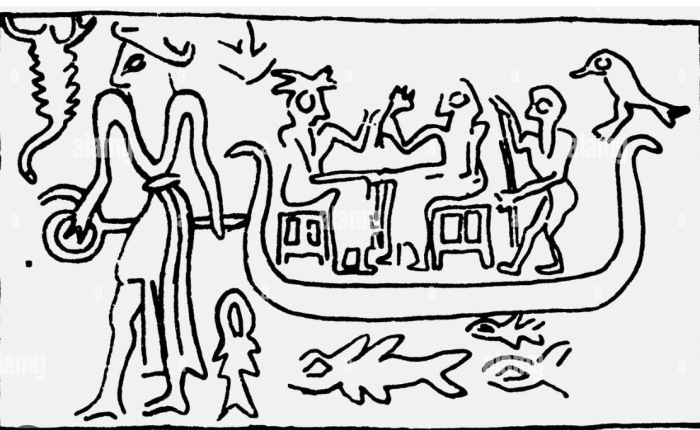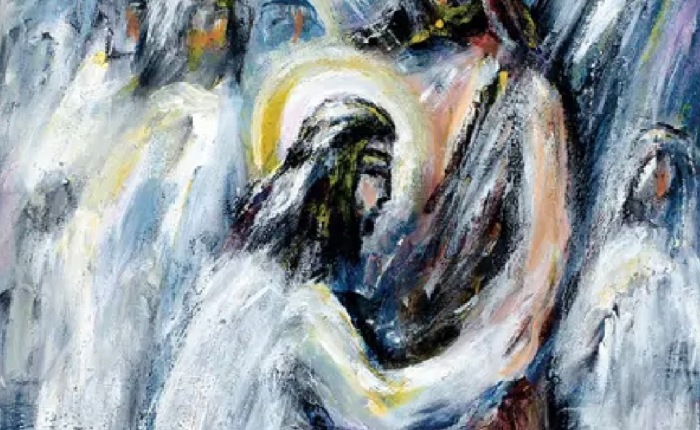Speaker Mike Johnson’s response when he was asked how he would make public policy? He replied:
“Well go pick up a Bible off your shelf and read it. That is my worldview.”
Pick up the Bible and get a worldview, as Mike Johnson suggests?
Many of us know the question is fraught from the start. Christians have hermeneutical methods for both receiving the Old Testament with appreciation as well as relegating it to a supporting role, citing progressive revelation. Jesus started it, with his famous mantra from the sermon on the mount, “you have heard that it was said by men of old (i.e. Moses)… but I say to you…”. That’s why “an eye for an eye and a tooth for a tooth” gets replaced with “love your enemies.”
But it is complicated; the dance of support and relegation leaves an opportunity for lots of interpretive improvisation; hang on tightly to the creation of humans “in the image and likeness” of the Divine as having enduring significance for ethics and politics so that “all men [sic.] are created equal” with “inalienable rights.” That part stays relevant. But never mind the bit about a genocidal worldwide flood as a solution to the problem of the “Sons of god” who saw that earthly daughters “were fair, and they took wives for themselves of all that they chose” (Gen. 6:2). That seems a bit too mythical to pay much attention to anymore.
And then there is all that blood. Hermeneutics finds ways to ignore the human slaughter that the Divine approves of, the slaughter that the Divine commands, and the slaughter that the Divine Himself (almost, but not always portrayed as male) accomplishes himself. After Making the idolatrous Golden Calf while Moses was up on the Mount Sinai receiving the Torah, the people made a golden calf to worship. That was considered treason, so Moses, upon discovering it commanded them saying, “ “Thus says the LORD, the God of Israel, ‘Put your sword on your side, each of you! Go back and forth from gate to gate throughout the camp, and each of you kill your brother, your friend, and your neighbor.’” The Israelites, en route to the Promised Land, were told by God, through Moses, to slaughter the Amalekites who resisted them. The people, men, women, and children were all put to the sword after the Lord knocked down the walls of Jericho. One could go on, but the point is made. Mike Johnson knows that these particular parts, but not the others, need to be relegated. However, since God does not change, maybe violence has a role to play in the Divine plan in the future too? The dance is open to improvisation.
The complications multiply. Preachers of Civil Rights like to quote the prophets who believed in the continuing relevance of the call to “let justice roll down like water” because God’s will was clear. “He has told you, O mortal, what is good; and what does the LORD require of you but to do justice, and to love kindness, and to walk humbly with your God?” But does doing justice mean that other people have a claim on your stuff? Shouldn’t they remember “you shall not covet your neighbor’s house; you shall not covet your neighbor’s wife, or male or female slave, or ox, or donkey, or anything that belongs to your neighbor.” Besides private property rights, that brings up the topic of slavery. Most of us think that the slavery part should be relegated, but it is there, right in the Ten Commandments, which people seem to want to keep as relevant for ethics and politics. Some even put them up in public courthouses. Oddly, they don’t seem to want to put up the Beatitudes, but they have their reasons. Mike Johnson has not specified which is more relevant to the worldview he finds obvious in the Bible.
But the Old Testament is taking too much attention here. The New Testament is the fuller revelation, according to classical Christian theology, and therefore the most important place to go to find a biblical worldview. Jesus gets primacy of place, but again, it is complicated and calls for hermeneutical deftness. “Turn the other cheek” and “love your enemies” is best understood metaphorically, and not as literal ethical or political mandates. “Do not judge” clearly does not refer to the judicial system; it is also a metaphor. “Do not store up for yourselves treasures on earth” likewise. Maybe these lofty ethics only belong to the coming millennial age after Christ returns, according to some branches of American Christianity.
After Jesus, Christians turn to Paul and the other epistle writers for worldview perspectives. But here again, it’s complicated. Paul congratulates Junia for being “prominent among the apostles” and writes that in Christ there is no “male and female.” But there is a pesky paragraph in 1 Corinthians that seems to not only uphold that distinction but also make those prominent apostolic women keep their mouths shut. “women should be silent in the churches. For they are not permitted to speak but should be subordinate, as the law also says. If there is anything they desire to know, let them ask their husbands at home. For it is shameful for a woman to speak in church.” There is a rationale for the subordination of women that extends beyond the church. It goes all the way back to the beginning, as Timothy explains, “For Adam was formed first, then Eve; and Adam was not deceived, but the woman was deceived and became a transgressor.” Women’s vulnerability to deception leads him, logically, to say, “I permit no woman to teach or to have authority over a man.” Mike Johnson must have a hermeneutical ploy in mind when this is applied to women today who serve in the Congress he presides over and the Supreme Court that interprets the laws they write. Worldviews are tricky.
Then there is the slavery issue again. Unfortunately, it is not simply an old Old Testament concern. Paul says that in Christ, “there is no longer slave or free,” and that an enslaved man named Onesimus should be treated by his owner Philemon “no longer as a slave but more than a slave, a beloved brother.” But other letters penned in Paul’s name advise slaves to “obey your earthly masters with fear and trembling.” Titus does not even dignify the slaves by direct address but rather advises masters to “Tell slaves to be submissive to their masters.” But certainly, Mike Johnson would not want slavery to be part of a biblical worldview, would he?
Maybe Mike was thinking more narrowly about specific concerns like the one his party holds up as essential: abortion. Maybe he is simply alluding to all the places where abortion is discussed and condemned. Maybe or maybe not, since the Bible doesn’t mention it — yes there is that one ambiguous text about a pregnant woman injured as collateral damage in a fight, but it’s both ambiguous and, again, it’s the Old Testament.
Anyway, Mike’s advice does not do much to clarify things for me and my worldview.


















